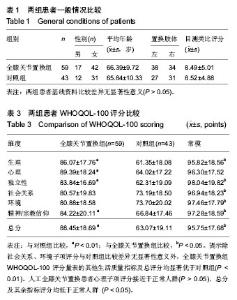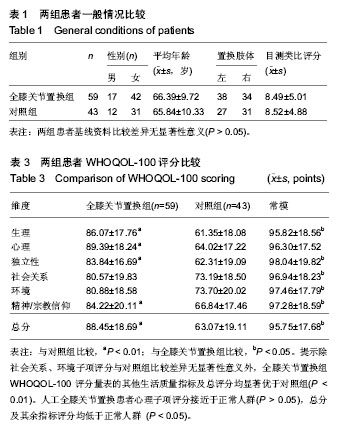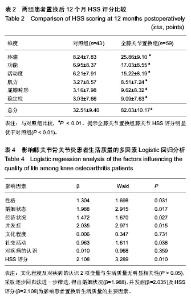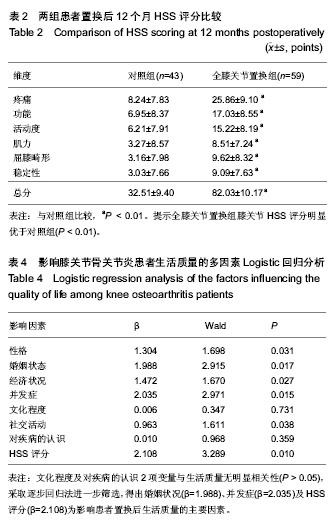Chinese Journal of Tissue Engineering Research ›› 2014, Vol. 18 ›› Issue (40): 6438-6443.doi: 10.3969/j.issn.2095-4344.2014.40.008
Previous Articles Next Articles
The quality of life and curative effect among elder patients after total knee replacement surgery for severe knee osteoarthritis
Xia Run-fu, Li Jian-feng, Yan Jin-yu, Zhang Shu-lian
- Department of Rehabilitation, Second Affiliated Hospital of Inner Mongolia Medical University, Hohhot 010030, Inner Mongolia Autonomous Region, China
-
Revised:2014-08-21Online:2014-09-24Published:2014-09-24 -
Contact:Zhang Shu-lian, Nurse-in-charge, Department of Rehabilitation, Second Affiliated Hospital of Inner Mongolia Medical University, Hohhot 010030, Inner Mongolia Autonomous Region, China -
About author:Xia Run-fu, Attending physician, Department of Rehabilitation, Second Affiliated Hospital of Inner Mongolia Medical University, Hohhot 010030, Inner Mongolia Autonomous Region, China
CLC Number:
Cite this article
Xia Run-fu, Li Jian-feng, Yan Jin-yu, Zhang Shu-lian. The quality of life and curative effect among elder patients after total knee replacement surgery for severe knee osteoarthritis[J]. Chinese Journal of Tissue Engineering Research, 2014, 18(40): 6438-6443.
share this article

2.1 参与者数量分析 本组研究所有病例均采用门诊随访、电话随访的方式,于术前及术后12个月的跟踪随访,由于死亡、失联等原因及其他原因不能配合完成随访患者全膝关节置换组5例(8%)、对照组4例(9%),失访患者数据亦进行相关统计。 2.2 基线资料比较 两组患者基线资料比较差异无显著性意义(P > 0.05),具有可比性,见表1。 2.3 两组患者膝关节功能恢复情况比较 两组患者置换后12个月HSS评分比较,全膝关节置换组膝关节HSS评分等级为良,总分为(82.03±10.17)分,明显优于对照组(32.51±9.40)分,组间差异有显著性意义(P < 0.01);各分项评分全膝关节置换组明显优于对照组(P < 0.01),见表2。 2.4 两组患者WHOQOL-100评分比较 除社会关系、环境子项评分与对照组比较差异无显著性意义外,全膝关节置换组WHOQOL-100评分量表的其他生活质量指标及总评分均显著优于对照组,组间比较差异有非常显著性意义(P < 0.01)。将全膝关节置换组各维度得分标准化转换后,与本地区普通人群生活质量得分比较发现,人工全膝关节置换患者心理子项评分接近于正常人群(P > 0.05),总分及其余指标评分均低于正常人群,差异有显著性意义(P < 0.05),见表3。 2.5 影响膝关节骨关节炎患者生活质量因素的Logistic回归分析 以膝关节骨关节炎患者是否行人工全膝关节置换为因变量,以性别、年龄、文化程度、性格、经济状况等多种因素进行Logistic回归分析,结果发现,婚姻状况、并发症及HSS评分是影响膝关节骨关节炎患者生活质量的主要因素,见表4。其中深静脉血栓影响患者离床时间,研究发现随访期间有配偶照顾对患者生活质量及心理状态都有正面的影响。 2.6 不良事件 本组除1例患者出现深静脉血栓转入血管外科治疗外,其他患者无明显感染、脂肪栓塞及腓总神经损伤等并发症发生。"

| [1] Felson DT, Lawrence RC, Dieppe PA, et al. Osteoarthritis: new insights. Part 1: the disease and its risk factors. Ann Intern Med. 2000;133: 635-646. [2] Khadem Haghighian M, Alipoor B, Eftekhar Sadat B,et al. Effects of sesame seed supplementation on lipid profile and oxidative stress biomarkers in patients with knee osteoarthritis. Health Promot Perspect. 2014;4(1):90-97. [3] Murray CJ, Lopez AD. Alternative projections of mortality and disability by cause 1990-2020: Global Burden of Disease Study. Lancet. 1997;349(9064):1498-1504. [4] Peláez-Ballestas I, Sanin LH, Moreno-Montoya J, et al. Epidemiology of the rheumatic diseases in Mexico. A study of 5 regions based on the COPCORD methodology. J Rheumatol Suppl. 2011;86:3-8. [5] Davatchi F, Jamshidi AR, Banihashemi AT, et al. WHO-ILAR COPCORD Study (Stage 1, Urban Study) in Iran. J Rheumatol. 2008; 35:1384. [6] Livshits G, Zhai G, Hart DJ, et al. Interleukin-6 is a sig-nificant predictor of radiographic knee os-teoarthritis: The Chingford study. Arthritis Rheum. 2009;60:2037-2045. [7] Bhattacharya I, Saxena R, Gupta V. Efficacy of vitamin E in knee osteoarthritis manage-ment of North Indian geriatric population. Ther Adv Musculoskelet Dis. 2012;4:11-19. [8] Niu J, Nevitt M, McCulloch C, et al. Comparing the functional impact of knee replacements in two cohorts. BMC Musculoskelet Disord. 2014;15:145. [9] Kim S. Changes in surgical loads and economic burden of hip and knee replacements in the US: 1997-2004. Arthritis Rheum. 2008;59(4):481-488. [10] Stranges E, Russo A, Friedman B. Procedures with the most rapidly increasing hospital costs, 2004-2007. AHRQ - Healthcare Cost and Utilization Project. Rockville: AHRQ - Healthcare Cost and Utilization Project, 2009:1-9. [11] Losina E, Thornhill TS, Rome BN, et al. The dramatic increase in total knee replacement utilization rates in the United States cannot be fully explained by growth in population size and the obesity epidemic. J Bone Joint Surg Am. 2012;94(3):201-207. [12] Devendra S, Robert K. Body Weight, Waist-to-Hip Ratio,Breasts, and Hips:role in judgments of female attractiveness and desirability for relationships. J Pers Soc Psychol. 1995;16:483-507. [13] Davis EM, Lynd LD, Grubisic M, et al. Responsiveness of health state utility values in knee osteoarthritis. J Rheumatol. 2013;40(12):2075-2082. [14] Vennu V, Bindawas SM. Relationship between falls, knee osteoarthritis, and health-related quality of life: data from the Osteoarthritis Initiative study.Clin Interv Aging. 2014;9: 793-800. [15] Tae B, Pelaggi ER, Moreira JG, et al. Impact of bariatric surgery on depression and anxiety symptons, bulimic behaviors and quality of life. Rev Col Bras Cir. 2014;41(3):155-160. [16] FarrIi J, Miller LE, Block JE. Quality of life in patients with knee osteoarthritis: a commentary on nonsurgical and surgical treatments. Open Orthop J. 2013;7:619-623. [17] Franic DM, Bothe AK. Psychometric evaluation of condition-specific instruments used to assess health-related quality of life, attitudes, and related constructs in stuttering. Am J Speech Lang Pathol. 2008;17(1):60-80. [18] Insall JN, Ranawat CS, Aglietti P, et al. A comparison of four models of total knee-replacement prostheses. J Bone Joint Surg Am. 1976;58(6):754-765. [19] The WHOQOL Group. The World Health Organization Quality of Life Assessment(WHOQOL):development and general psychometric properties. Soc Sci Med. 1998;46:1569-1585. [20] Jordan KM, Arden NK, Doherty M, et al. EULAR Recommendations 2003: an evidence based approach to the management of knee osteoarthritis:Report of a Task Force of the Standing Committee for International Clinical Studies Including Therapeutic Trials(ESCISIT). Ann Rheum Dis. 2003; 62:1145-1155. [21] Arnold CM, Gyurcsik NC. Risk factors for falls in older adults with lower extremity arthritis: a conceptual framework of current knowledge and future directions. Physiother Can. 2012; 64(3):302-314. [22] Prieto-Alhambra D, Nogues X, Javaid MK, et al. An increased rate of falling leads to a rise in fracture risk in postmenopausal women with self-reported osteoarthritis: a prospective multinational cohort study (GLOW). Ann Rheum Dis. 2013; 72(6):911-917. [23] Vennu V, Bindawas SM. Relationship between falls, knee osteoarthritis, and health-related quality of life: data from the Osteoarthritis Initiative study. Clin Int Aging. 2014;9:793-800. [24] Marcum ZA, Zhan HL, Perera S. Correlates of gait speed in advanced knee osteoarthritis. Pain Med. 2014;15(8): 1334-1342. [25] Utrillas-Compaired A, De la Torre-Escuredo BJ, Tebar-Martínez AJ, et al. Does preoperative psychologic distress influence pain, function, and quality of life after TKA? Clin Orthop Relat Res. 2014;472(8):2457-2465. [26] Bennell KL, Hunt MA, Wrigley TV, et al. Role of muscle in the genesis and management of knee osteoarthritis. Rheum Dis Clin North Am.2008;34: 731-754. [27] Al-Johani AH, Kachanathu SJ, Ramadan Hafez A, et al. Comparative study of hamstring and quadriceps strengthening treatments in the management of knee osteoarthritis. J Phys Ther Sci. 2014;26(6):817-820. [28] Hurley MV, Scott DL, Rees J, et al. Sensorimotor changes and functional performance in patients with knee osteoarthritis. Ann Rheum Dis. 1997;56: 641-648. [29] Zhang M, Driban JB, Price LL, et al. Development of a rapid knee cartilage damage quantification method using magnetic resonance images. BMC Musculoskelet Disord. 2014;15(1): 264. [30] Peat G, McCarney R, Croft P. Knee pain and osteoarthritis in older adults: a review of community burden and current use of primary health care. Ann Rheum Dis. 2001;60:91-97. [31] Debette C, Lustig S, Servien E, et al. Total knee arthroplasty of the stiff knee: three hundred and four cases. Int Orthop. 2014;38(2):285-289. [32] Clifford AG, Gabriel SM, O'Connell M, et al. The KineSpring(®) Knee Implant System: an implantable joint-unloading prosthesis for treatment of medial knee osteoarthritis. Med Devices (Auckl). 2013;6:69-76. [33] Rasanen P, Paavolainen P, Sintonen H, et al. Effectiveness of hip or knee replacement surgery in terms of quality-adjusted life years and costs. Acta Orthop, 2007;78(2):108-115. [34] Corona PS, Hernandez A, Reverte-Vinaixa MM, et al. Outcome after knee arthrodesis for failed septic total knee replacement using a monolateral external fixator. J Orthop Surg (Hong Kong). 2013;21(3):275-280. [35] Keurentjes JC, Fiocco M, So-Osman C, et al. Hip and knee replacement patients prefer pen-and-paper questionnaires: Implications for future patient-reported outcome measure studies. Bone Joint Res. 2013;2(11):238-244. [36] Murray DW, MacLennan GS, Breeman S, et al. A randomised controlled trial of the clinical effectiveness and cost-effectiveness of different knee prostheses: the Knee Arthroplasty Trial (KAT). Health Technol Assess. 2014;18(19): 1-235. [37] B?czyk G, Chuchracki M, Opala T. Effect of selected socio-demographic, clinical and biochemical factors on self-reported quality of life among post-menopausal women with osteoporosis. Ann Agric Environ Med. 2013;20(4): 843-848. [38] Unalan D, Soyuer F, Ozturk A. Comparison of SF-36 and WHOQOL-100 life quality scales in early period tuberculosis subjects. J Pak Med Assoc. 2012;62(11):1161-1167. [39] Rupp S, Wydra G. Rehabilitation following total knee replacement. Conservative orthopedics and sport science. Orthopade. 2012;41(2):126-135. [40] Goddard NJ, Mann HA, Lee CA. Total knee replacement in patients with end-stage haemophilic arthropathy: 25-year results. J Bone Joint Surg Br. 2010;92(8):1085-1089. [41] Muenzberg M, Stretz C, Baur W, et al. Gender influence on the outcome of an unisex total knee arthroplasty system. Technol Health Care. 2014;22(1):129-136. |
| [1] | Liang Xin, Wang Heng, Li Xian-rong. Preoperative application of alprazolam for patients with anxiety and depression and pain after total knee arthroplasty: its safety and effectiveness [J]. Chinese Journal of Tissue Engineering Research, 2017, 21(7): 985-992. |
| [2] | Shi Bin, An Jing, Chen Long-gang, Zhang Nan, Tian Ye . Influencing factors for pain after total knee arthroplasty [J]. Chinese Journal of Tissue Engineering Research, 2017, 21(7): 993-997. |
| [3] | Wang Xian-xun. Impact of local compression cryotherapy combined with continuous passive motion on the early functional recovery after total knee arthroplasty [J]. Chinese Journal of Tissue Engineering Research, 2017, 21(7): 998-1003. |
| [4] | Lu Yao-jia, Xiong Chuan-zhi, Li Xiao-lei, Hu Han-sheng, Chen Gang, Wang Qiang, Lu Zhi-hua. Comparison of two methods for reducing blood loss during total knee arthroplasty [J]. Chinese Journal of Tissue Engineering Research, 2017, 21(7): 1004-1008. |
| [5] | Yuan Wei, Zhao Hui, Ding Zhe-ru, Wu Yu-li, Wu Hai-shan, Qian Qi-rong. Association between psychological resilience and acute mental disorders after total knee arthroplasty [J]. Chinese Journal of Tissue Engineering Research, 2017, 21(7): 1015-1019. |
| [6] | Lin Han-wen, Wen Jun-mao, Huang Chao-yuan, Zhou Chi, Tang Hong-yu. Correlation between the changes in lower limb power line and pain area in the knee osteoarthritis patients: imaging evaluation [J]. Chinese Journal of Tissue Engineering Research, 2017, 21(7): 1110-1114. |
| [7] | Ye Xiang-yang, Sun Xiang, Tang Li-xin, Zhen Ping, Geng Bin, Wang Hua-lei, Zhao Yu-guo. Acetabular liner wear of cross-linked versus conventional polyethylene for total hip arthroplasty: a meta-analysis [J]. Chinese Journal of Tissue Engineering Research, 2017, 21(7): 1143-1148. |
| [8] | Tian Hai-tao, Wang Yuan-he, Tian Shao-qi, Zhang Xu-teng, Sun Kang. Effects and safety assessment of methylprednisolone on postoperative nausea and vomiting and pain after total knee arthroplasty [J]. Chinese Journal of Tissue Engineering Research, 2017, 21(3): 335-339. |
| [9] | Wei Zhi-hui, Zhang Zhong-zu, Zhang Ming-hua. Intravenous combined with topical application of tranexamic acid in primary total hip arthroplasty: a meta-analysis of efficacy and safety [J]. Chinese Journal of Tissue Engineering Research, 2017, 21(3): 464-470. |
| [10] | Jia Jin-ling, Dong Yu-zhen. Finite element analysis of prosthesis position during hip arthroplasty [J]. Chinese Journal of Tissue Engineering Research, 2017, 21(3): 401-405. |
| [11] | Zhu Shi-bai, Zhai Jie, Jiang Chao, Ye Can-hua, Chen Xi, Weng Xi-sheng, Qian Wen-wei. Application of “enhanced recovery after surgery” in the perioperative period of total knee arthroplasty [J]. Chinese Journal of Tissue Engineering Research, 2017, 21(3): 456-463. |
| [12] | Hu Jun, Zhang De-qiang, Tang Xin. Postoperative quality of life of internal fixation versus hemiarthroplasty for femoral neck fractures in the elderly [J]. Chinese Journal of Tissue Engineering Research, 2017, 21(19): 2953-2960. |
| [13] | Sun Hao, Wei Jun-qiang, Liu Li-rui, Yan Shi, Jin Yu, Feng Zhen. Time of lower extremity deep venous thrombosis after hip arthroplasty in senile patients with osteoporotic femoral neck fractures [J]. Chinese Journal of Tissue Engineering Research, 2017, 21(19): 2961-2965. |
| [14] |
Gao Wei-lu, Li Hong, Liu Bi-quan, Hu Yong, Liu Jing-jun, Yin Li, Liu Hu, Mei Bin, Yin Zong-sheng.
Analgesic effect of femoral and sciatic nerve block under multimodal analgesia in total knee arthroplasty
|
| [15] | Bai Zhao-hui, Zhang Ying, Yin Qing-shui, Xia Hong, Wang Jian-hua, Xu Jun-jie. Navigational template applied in the orthopaedic field in China: a bibliometric analysis [J]. Chinese Journal of Tissue Engineering Research, 2017, 21(19): 3023-3030. |
| Viewed | ||||||
|
Full text |
|
|||||
|
Abstract |
|
|||||

